 Petzlover
Petzlover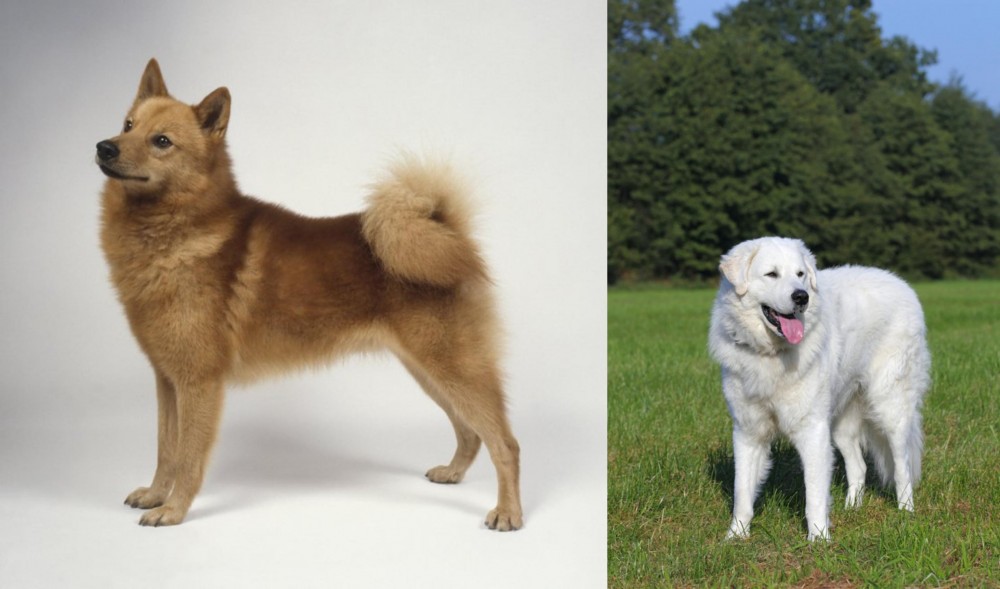 Finnish Spitz is originated from Finland but Kuvasz is originated from Hungary. Finnish Spitz may grow 26 cm / 10 inches shorter than Kuvasz. Finnish Spitz may weigh 37 kg / 81 pounds lesser than Kuvasz. Both Finnish Spitz and Kuvasz has almost same life span. Both Finnish Spitz and Kuvasz has almost same litter size. Both Finnish Spitz and Kuvasz requires Moderate Maintenance.
Finnish Spitz is originated from Finland but Kuvasz is originated from Hungary. Finnish Spitz may grow 26 cm / 10 inches shorter than Kuvasz. Finnish Spitz may weigh 37 kg / 81 pounds lesser than Kuvasz. Both Finnish Spitz and Kuvasz has almost same life span. Both Finnish Spitz and Kuvasz has almost same litter size. Both Finnish Spitz and Kuvasz requires Moderate Maintenance.
 The “barking Bird Dog” or Finnish Spitz was Developed in Finland. The breed is fearless and small with a different style than many other hunting dogs. He style of tracking is unusual and he indicated his quarry by barking. He was bred to hunt all sizes of prey from as large as bears to as small as squirrels. He was called the “Barking Bird Dig” because he pointed at the prey by barking and giving the hunter knowledge of the prey and an easy approach to it. In Finland, the Spitz is still a hunting dog. In 1979 The Finnish Spitz became the national dog of Finland.
The “barking Bird Dog” or Finnish Spitz was Developed in Finland. The breed is fearless and small with a different style than many other hunting dogs. He style of tracking is unusual and he indicated his quarry by barking. He was bred to hunt all sizes of prey from as large as bears to as small as squirrels. He was called the “Barking Bird Dig” because he pointed at the prey by barking and giving the hunter knowledge of the prey and an easy approach to it. In Finland, the Spitz is still a hunting dog. In 1979 The Finnish Spitz became the national dog of Finland.
Spitz-like dogs have been present in Finland for over 8000 years. It is believed that dogs living in higher latitudes had more in common with the Taymyr Wolf od North Asia than with the gray wolf. Tests indicate that the chance of the Spitz being related to the Taymyr is between 1.4&a and 27.3%. The Taymyr is extinct today. This shows that the present day dog descends from more than one type of wolf and more than one area. The Spitz was a favorite of the Finno-Ugrian tribes as he helped them find food. These tribes were pretty isolated until 1880. Then the Spitz were mated with other dogs and were almost extinct as a breed separate from all the other local dogs.
However, like many other breeds the Finnish Spitz found a savior. A Finnish huntsman, named Hugo Roos, noticed the native Finnish Spitz while he was hunting up North. He decided to breed dogs that were genuine Finnish Spitz without the blood of other breeds mixed in. After thirty years the current day Finnish Spitz was born.The latest breed standard was confirmed by the Love Finnish Kennel Club in 1996.
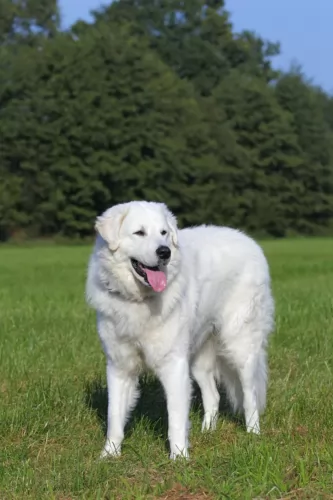 The Kuvasz is an ancient dog breed from Hungary. It is believed that the dog is the oldest of the ancient Hungarian dog breeds, and in fact a fossilized skeleton dating back to the 9th century, and almost identical to the modern Kuvasz, was found near Keszthely.
The Kuvasz is an ancient dog breed from Hungary. It is believed that the dog is the oldest of the ancient Hungarian dog breeds, and in fact a fossilized skeleton dating back to the 9th century, and almost identical to the modern Kuvasz, was found near Keszthely.
During the 15th century the Kuvasz became very sought after, being found in royal courts. Puppies were given as royal gifts. Later the popularity of the breed waned and then it was found in its traditional role of guarding livestock.
As Kuvasz numbers dwindled, breeding efforts were started but it is believed that other large dogs such as the Great Pyrenees were used with the Kuvasz to continue with the breeding programs.
In 1884, the first Hungarian standard for the breed was written. It was in 1966 that the Kuvasz Club of America was established.
 The Finnish Spitz is balanced and symmetrical in body and females are longer than males. They have a very distinguishable prick, foxy ears and face. They have a smiling expression and a curved tail. They are a golden-red color with a double coat. The under coat is dense and soft While the top coat is stiff. Puppies often look like little red fox cubs. When born they are black, grey or brown with a lot of black. As an adult the pups grow up to be a mix of fawn and dark black. Lips, nose and rims of the eyes should be black.
The Finnish Spitz is balanced and symmetrical in body and females are longer than males. They have a very distinguishable prick, foxy ears and face. They have a smiling expression and a curved tail. They are a golden-red color with a double coat. The under coat is dense and soft While the top coat is stiff. Puppies often look like little red fox cubs. When born they are black, grey or brown with a lot of black. As an adult the pups grow up to be a mix of fawn and dark black. Lips, nose and rims of the eyes should be black.
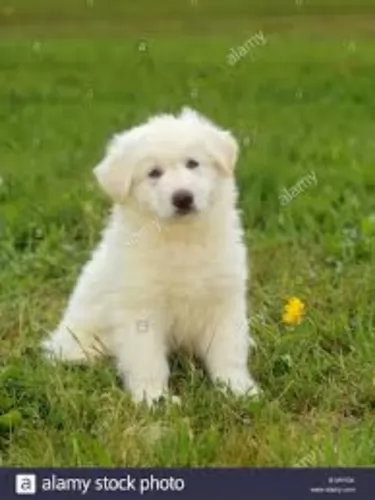 The beautiful Kuvasz is a large, muscled dog standing at 65 – 76cm in height and weighing 35 – 52kg. He has a double coat of dense white hair which can be straight or wavy.
The beautiful Kuvasz is a large, muscled dog standing at 65 – 76cm in height and weighing 35 – 52kg. He has a double coat of dense white hair which can be straight or wavy.
It is natural for the dog to lose most of the long coat during the Summer months. In other words this dog has a seasonal coat.
The nose is black, the eyes brown and alert, the ears are of medium length and floppy and the tail is carried long and low.
The Kuvasz is an intelligent dog who will benefit from training and socialization. It is always wise to have large dogs like this trained because just his size can cause problems if he isn’t obedient.
He is also described as a clownish type of dog which means he’ll entertain and amuse you. Certainly he is playful as a puppy but he calms down quite a bit as he grows into maturity. He is independent, and those who have owned such a dog report that he can be loving and loyal with his human family, wanting to guard and protect them. Others will say that he tended to be aloof, even with his human family.
Used as working dogs, the Kuvasz has learned to be independent and they will need a firm, strong owner who is also fair with them, otherwise they just do their own thing. They’re active dogs and because of their size they won’t suit city living where there is a tiny garden.
 Very child friendly – loves to play with children as long as the children pay attention to them. If not, the Spitz will go elsewhere.
Very child friendly – loves to play with children as long as the children pay attention to them. If not, the Spitz will go elsewhere.
They are independent thinkers and close to family but not strangers. They often “yodel” instead of howl.
Needs to be with people, bonds deeply with his humans. Most get along well with other dogs but because of their hunting instinct they are not good with small pets or birds.
They are smart and learn easily. They are great athletes and learn games and competition well.
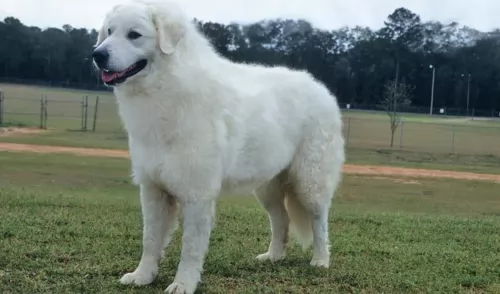 Kuvasz are guarding dogs, they’re intelligent and loyal, making them excellent family dogs with the right training and socialization.
Kuvasz are guarding dogs, they’re intelligent and loyal, making them excellent family dogs with the right training and socialization.
They’re able to get on well with other pets in the home as well as children. He is a beautiful dog and another bonus is that he isn’t particularly high maintenance.
As is common with many other large-breed dogs, he will have a shorter lifespan than what you’d get with a smaller dog breed, but if you feed him high quality food, exercise him and involve him in your activities, this large dog can become a wonderful friend and protector for you.
 Typically, a somewhat healthy breed, the Finnish Spitz does struggle with a few genetic concerns. They have been known to suffer from:
Typically, a somewhat healthy breed, the Finnish Spitz does struggle with a few genetic concerns. They have been known to suffer from:
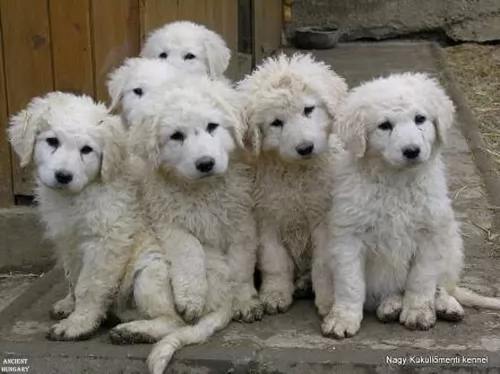 The large Kuvasz is a healthy dog breed that with good care can reach 12–14 years of age. Being the large dog that he is, he may well be prone to bone and joint problems. It is why good nutrition is so important for this dog - feeding him the best food with vitamins and minerals.
The large Kuvasz is a healthy dog breed that with good care can reach 12–14 years of age. Being the large dog that he is, he may well be prone to bone and joint problems. It is why good nutrition is so important for this dog - feeding him the best food with vitamins and minerals.
You know the saying ...you are what you eat... and this applies to dogs too. Good food can help to ward off serious illnesses. Big dogs like this often have to contend with hip dysplasia which can be both painful and debilitating as well as eye diseases.
This is where the eyelid of the dog rolls inwards, causing irritation and pain for the dog. There is also Ectropion, where the eyelid rolls outwards.If you see your pet has a red eye which is watery and which has pus, visit your vet. Entropion surgery will correct and repair and condition.
 Don’t overfeed the little guy. The Spitz had a good appetite for a dog its size and can gain weight quickly . Feed twice a day about 1/8th of a cup.
Don’t overfeed the little guy. The Spitz had a good appetite for a dog its size and can gain weight quickly . Feed twice a day about 1/8th of a cup.
The same advice hold for the adult dog. Feed 1/4th of a cub of high quality dry food twice a day.
When the Spitz is a puppy you should limit strenuous exercise and jumping. Don’t spay neuter at too young an age. Wait until they are mature at 3-5 years of age.
Again do not exercise vigorously at too young an age. When older the Finnish Spitz will need a yard to run in and exercise to satisfy his hunting instincts. A long walk every day is a must.
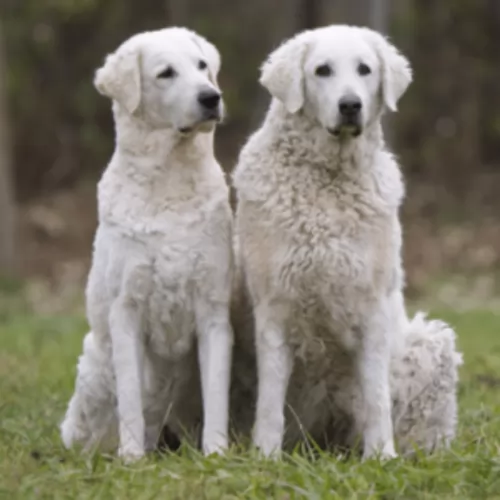 The coat may be fairly long and thick but it doesn’t require any special kind of grooming. A good brush twice a week will be adequate and will help with getting rid of stubborn knots and matting.
The coat may be fairly long and thick but it doesn’t require any special kind of grooming. A good brush twice a week will be adequate and will help with getting rid of stubborn knots and matting.
He is a seasonal shedder and this frequent brushing will make sure the coat remains groomed and shiny.
The Kuvasz is a hardy breed who just loves the outdoors. He is a dog that doesn’t do well in the heat. Make absolutely sure that he has a cool, sheltered spot where he can lie down. Ensure that there is always a bowl of fresh, cool water available to him.
There is quite a bit of conflict and controversy regarding nutrition in dogs. The idea is to keep it simple. If you buy a commercially manufactured dog food, check the ingredients on the packaging.
You want to be sure your pet is getting vitamins and minerals in instead of preservatives, fillers and colorants. Try and give him some home made food too such as some chicken, brown rice or pasta and some vegetables. You can mix this into his dry kibble occasionally with a little bit of raw meat too when you have.
Avoid feeding your dog things such as chocolates, nuts, onions, sweets and chips.